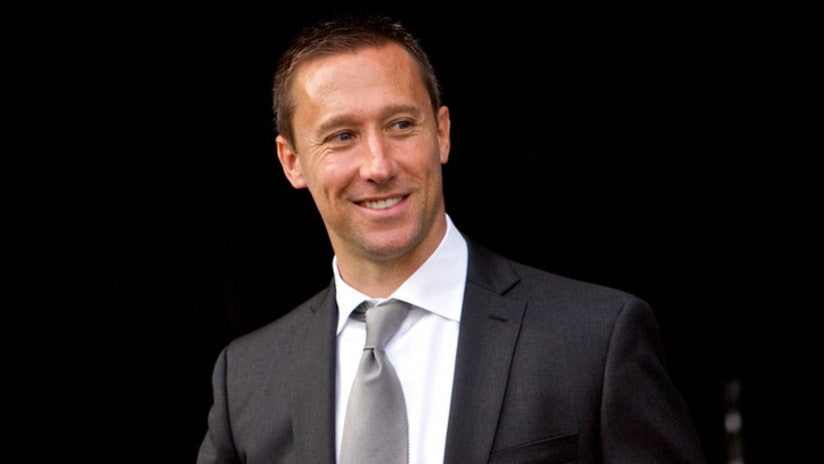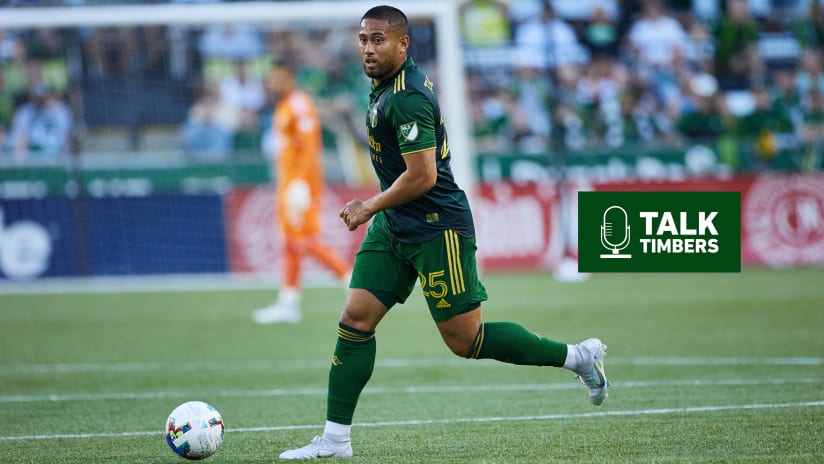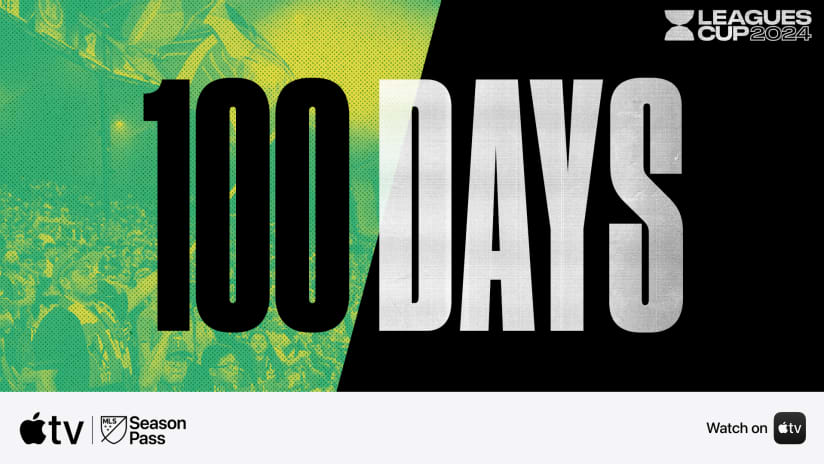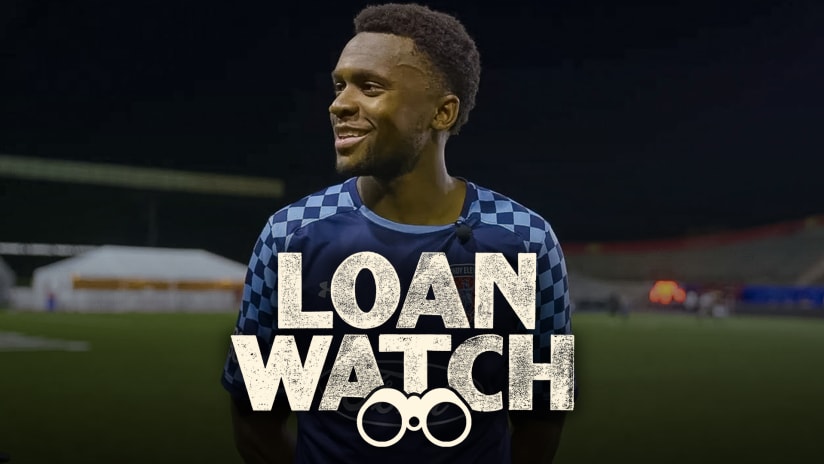With his first season in Major League Soccer well under way, Portland Timbers head coach Caleb Porter has not only already made a clear impact on the club, but remains a keen observer of the game and his players.
Happily settled in Portland with his family after moving cross country from the University of Akron, Porter quickly established a new playing style with the Timbers that his squad took to immediately. After a series of key player moves to merge with an existing core, Porter has begun to lay the foundation for a culture of winning.
With the club currently in the thick of a playoff race, we sat down with Porter for an exclusive interview to hear about his first season in MLS thus far, his experiences in his new city, surprises, playing philosophies and the challenges of coaching a broad roster composed of different personalities and backgrounds.
What’s been the most surprising thing for you in your first year as a head coach in Major League Soccer?
Caleb Porter: I would say the most surprising thing from a soccer standpoint is how quick it has gone. I was used to being a coach where I’m 100% invested every day for four months, essentially. I never really approached my college job as a four-month job, but the reality is our season was four months.
Going into a professional season, I wondered how that nine-month season would feel. I think that’s been my biggest surprise. Just how comfortable I’ve been in this grind and how quick it has gone. I think that says a lot about how much I’m enjoying it. Every day I’ve woken up feeling invigorated and stimulated and looking forward to the day and the next game.
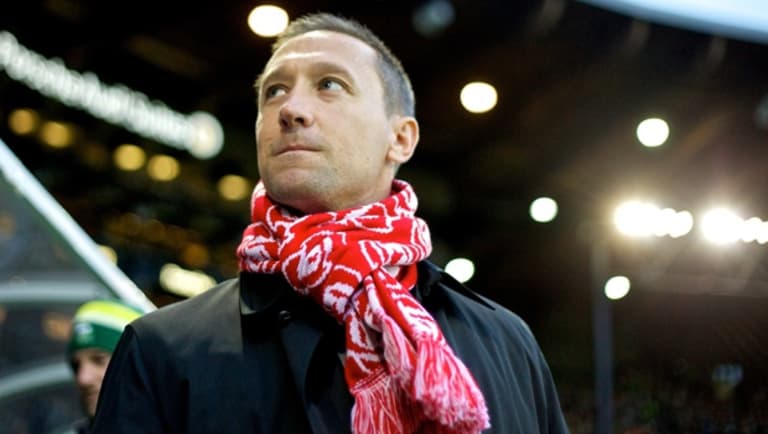
Photo: Craig Mitchelldyer
Anything surprise you about adjusting to Portland as a new city for you and your family?
CP: I don’t know if it’s a surprise, because I anticipated we would really like the city. But I think I would say it has even exceeded our expectations in terms of how much we enjoy Portland. My family really likes the community feel. That was important to us. We’re not big city people. Obviously Portland is a bigger city than Akron, so we wondered if we would still have that sense of community and we’ve really enjoyed that. Also, in where we live, it’s just a wonderful family atmosphere. That seems to be a priority around here—family, community. People are very friendly and warm.
If you were to sum up your club's playing philosophy in just three words, what would they be?
CP: I think it’s three P’s. It’s possession, it’s pressure, and it’s passion.
If I’m breaking it down in more detail on the attacking side, I think the possession is more passing with precision and purpose. If you’re breaking it down on the defensive side a little further, the pressure is persistent, punishing pressure. If you’re breaking down the passion side of it, it’s the passion for the club. The passion for our team. Passion for our supporters. The passion for the game. The passion for our philosophy. The passion for our mission.
Many Timbers players have spoken to the idea that they feel they have a great deal of freedom to create and play within your system. How would you say you balance your need for specific roles with a player’s individual expression?
CP: We need to create a structure where there are definite roles and responsibilities on both the attacking side and on the defending side, where everybody knows exactly what they should be doing within our system.
But within that, we need individual players to feel—I don’t know if “freedom” is the word—but to feel as if their strengths and talents can come out. That’s the key. I think the real thing is getting guys in the right spots where they know what you need out of them, and what they’re doing is really playing to their strengths.
You look at an orchestra, right? You’ve got a lot of different instruments and if you take out one then the music doesn’t sound the same. But all together you create music because everybody brings a different instrument and a different sound. We are very much trying to create the same thing. Together, we play the game, hopefully, in a way where we look like we’re a team, and we look like we’re organized, and we look like we’re playing in harmony, but then, like I said, you can’t win unless you have guys that are going to make plays, and guys that have individual talents and individual game changing ability and individual quality.
After having great success in developing young players while with a college program, you now have a squad of varying ages and backgrounds. Do you find that how you coach a younger player is different than how you work with a veteran player?
CP: I think with the younger players it’s about still shaping them into more complete professionals in all aspects on and off the field. With an older player, it’s less about trying to shape them and develop them and it’s more about taking who they are and making sure that you put them in a role where they can be good at what they do.
Senior players still want to be led. They still want to be told what you want out of them. No matter how old they are, they want to know that you’re preparing them to win. They want to know that you know what you’re doing. They want to know that you’re going to give them the opportunity to succeed individually and collectively.
You can’t just cookie-cutter it; thinking an older player is like this and a younger player is like that. But generally, within that, you have to approach each player on a case-by-case basis, because every player is unique. Every player comes from different upbringings, backgrounds, and cultures. The buttons you push for every player are unique. You really have to do the best you can to get the right read. You don’t always get it right but the better you know your players the easier it is to manage them.
I really think a big part of managing a team is understanding psychology. It’s a huge part of building winning teams. It’s very much about your leadership and it’s very much about your understanding of emotional intelligence and psychology.
I wake up every day thinking “Ok, I need to make sure the locker room is right. I need to make sure the spirit is there. I’ve got to make sure as best as I can guys are on board.” Or at least as best I can, get them understanding and respecting what were doing. Often times it’s as simple as motivating them because you are very motivated. Attention to detail in your man management and especially tactical preparation is imperative to continue to earn a professional player’s respect enough so they continue to listen.
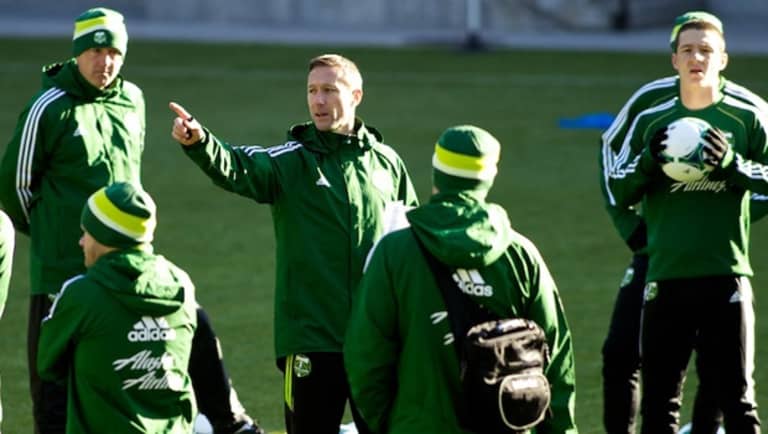
Photo: Craig Mitchelldyer
What more do you want to see from the team at this stage?
CP: I think what is positive is you see an identity. We definitely see a playing style that has been created. We wanted to implement a philosophy where we would have a clear method or identity, Where we could brand our club. Not so much for aesthetic reasons because that is only small part of it. You do want to brand yourself in a way that’s unique and in a way where your supporters can resonate with the club, so they can be proud of the way your team plays.
But for me, more importantly, it’s about trying to follow a philosophy so that you can breed consistency game-in and game-out, so we will hopefully have a better chance to win games and ultimately trophies. Because first and foremost we want to be a winning club and winning clubs have a blueprint they follow that acts as their daily roadmap. This blueprint formulates the basis that all decisions are based on with regards to player acquisitions, etc. If you don’t have a vision for what you want to be or where you want to go or how you want to play, how can you make decisions? Philosophy is a fluffy word that is overused but really it just means you have a plan.
I’m really pleased to see that in a short amount of time we’ve created a very clear identity. It’s not always easy, especially when you have a bunch of new pieces and new players and new coach. But I think it’s obvious we have made progress and after only 8 months we are certainly on the right track and you can see it taking shape.
In saying that, we’re just scratching the surface of the level we can execute at. You can see the way we play and attack—we’re a passing team, a possession team. You can see overall what we’re trying to do there. You can see we’re a pressing team. You can see that kind of philosophy. It’s clear. But I think we can still do it a lot better. I think it will only get better with more time and a few more pieces.
Certainly the more continuity you have and the more you continue to reinforce the same concepts and the same ideas in training, the more it’s just going to grow and build. Obviously we’re really focused on this year, trying to do as well as we can to make the playoffs. That’s a big step. That’s a big hurdle. We need to be a team that’s consistently in the playoffs. We need to get over that hump and have that break through. But I’m eager to see in future years, especially when you’re taking the same pieces in preseason and it’s not as new and now things become more second nature. It will be exciting to see how much more clear it will be in terms of our sharpness and quality moving forward.

